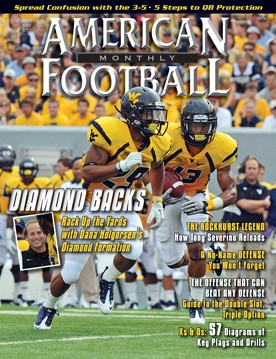Article CategoriesAFM Magazine
|
Reloading at Rockhurst – Tony Severino, the head coach at Rockhurst High School for 29 years, believes in keeping his players busy in all aspects of their lives – not just on the field.by: Steve Dorsey© More from this issue It was near the end of an hour-long interview when Tony Severino was asked a question that he has fielded numerous times in recent years. “How much longer do you think you’ll coach?” His answer is the same every time. “I get asked that every day. You’re the second one today that’s asked me,” said Severino, who will turn 64 in September. “I’ve been saying, ‘five years’ for the last 10 years. I have such a good time doing what I do. When I don’t, I’ll get out. When I no longer get goose bumps on Friday night when I run out onto that field and when I forget what it’s like to be a player, then it’s time to get out. I tell the kids, ‘You need my wisdom and I need your enthusiasm.’” Severino has been sharing his wisdom, his enthusiasm for coaching football and his winning formula with players at Rockhurst High ....The full article can only be seen by subscribers.
|
|
|||||||
| HOME |
MAGAZINE |
SUBSCRIBE | ONLINE COLUMNISTS | COACHING VIDEOS |
Copyright 2025, AmericanFootballMonthly.com
All Rights Reserved





